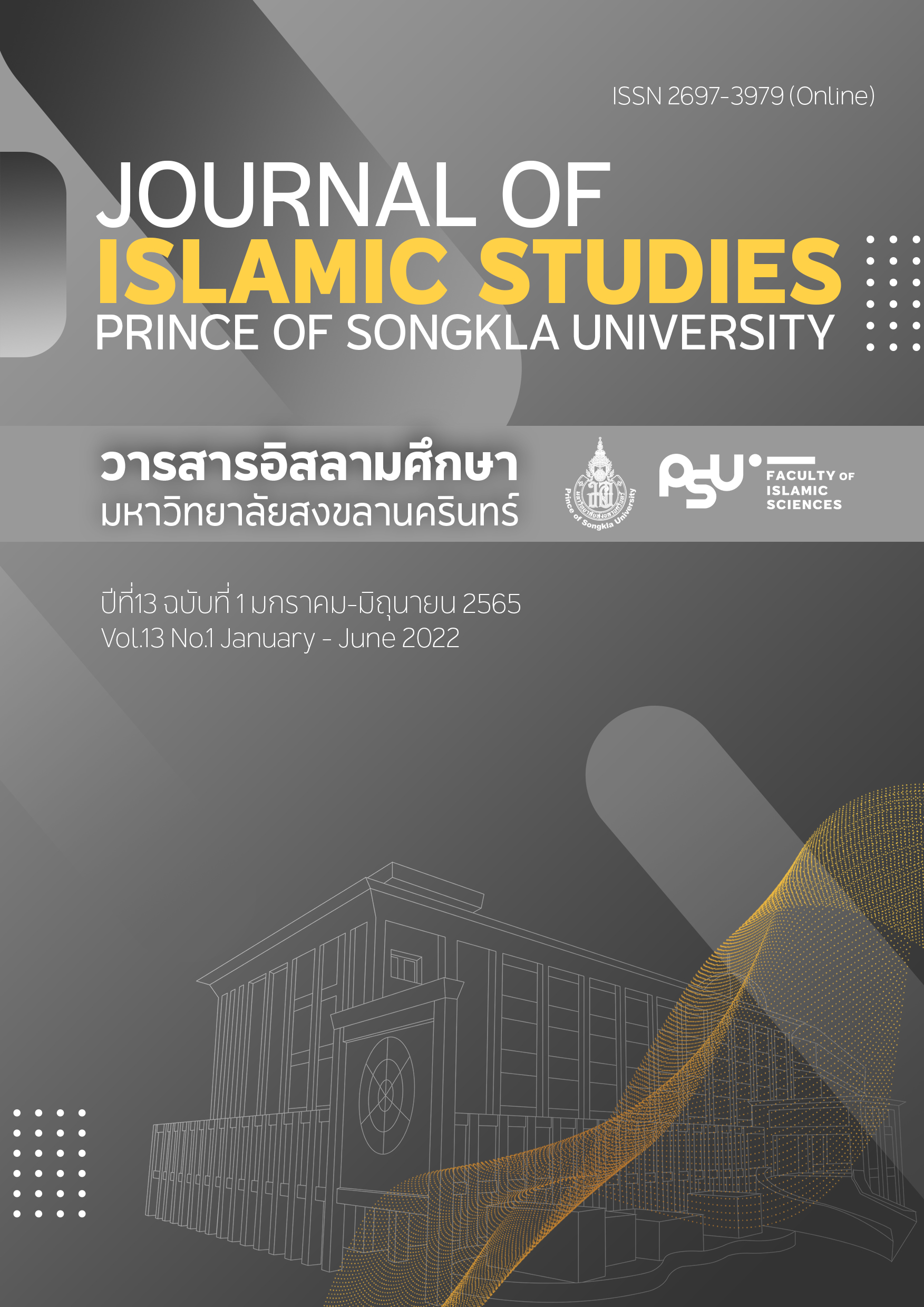The Adjustment of Teaching of Islamic Studies Pre-Service Teachers Faculty of Islamic Sciences in Pandemic Covid-19
Keywords:
Adjustment, Pandemic Covid-19Abstract
Objective This research aimed at presenting the adjustment of teaching of Islamic studies Pre-Service Teachers in Pandemic Covid-19.
Methodology This study employed qualitative approach. Data were collected by focus group and in-depth interview by using semi structured questions through 11 key informants which are students of teaching of Islamic studies who were purposely selected based on criterion. The data then were content analyzed.
Research findings The results revealed that the adjustment of teaching of Islamic studies Pre-Service Teachers in Pandemic Covid-19 consist of 3 dimensions which researchers have adapted from performance standards of Teachers Council Regulations on Professional Standards (No. 4) B.E. 2562 are 1) The performance of teacher duties, including the development of learners with the spirit of being a teacher. Encourage learning, empathy and acceptance of individual learners' differences. Inspiring learners, self-development to be knowledgeable behave as a role model ethical. 2) Learning management, including preparation of lesson plans, teaching and learning management, and organizing activities to create a learning atmosphere, supervision, assistance, development, and individual learner development reports, innovation, media, and apply technology, creative teamwork, and learning measurements, and 3) Relationships with parents and communities, including cooperation with parents in developing and solving learner problems. Creating a network of cooperation, education, access to the context of the community. and coexisting on the basis of cultural differences and promoting and conserving culture and local wisdom
Contributions: The finding of the research showed that students, educational personnel, school administrators and teacher development institutions can be utilized it to design, plan, and prepare for pre-service teachers practicum in Pandemic Covid-19 as well as National Office of Teacher Professional Experience Standards.
References
Abdul Kadir, F., & Abdul Aziz, A. (2021). Teaching Practicum during Covid-19 Pandemic: A Review of the Challenges and Opportunities of Pre-service Teachers. International Journal of Academic Research in Business & Social Sciences. 11(4), 1175-1183.
Abd Hadi Bunyamin, M., Hanri, C., Mohd Rameli, M. R., & Ahmad Alhassora, N. S. (2021). The Pre-service Teachers’ Internship Program during the Pandemic Prospects for a New Landscape of Teacher Education. Revista Geintec Gestao Inovagao Technologias, 11(3), 807-824.
Adeeb, M. J. (2020). The Challenges Faced by Pre-Service Mathematics Teachers during their Teaching Practice in the UAE: Implications for Teacher Education Programs. International Journal of Learning, Teaching and Educational Research, 19(7), 23-34.
Affouneh, S., Salha, S., & Khalif, Z.N. (2020). Designing Quality E-Learning Environments for Emergency Remote Teaching in Coronavirus Crisis. Interdisciplinary Journal of Virtual Learning in Medical Sciences, 11(2), 1-3.
Bozkurt, A., & Sharma, R. C. (2020). Emergency remote teaching in a time of global crisis due to CoronaVirus pandemic. Journal of Distance Education, 15(1), I-VI.
Ersin, P., Atay, D., & Mede, E. (2020). Boosting Preservice Teachers’ Competence and Online Teaching Readiness through E-Practicum during the COVID-19 Outbreak. International Journal of TESOL Studies, 2(2), 112-124.
Langputeh, S. & Makeng, M. (2021). Trends of Basic Islamic Educational Management in Southern Thailand after the Pandemic Covid-19). Journal of Islamic Studies, Prince of Songkla University, 12 (1), 1-13.
Panto, P. (2020). Teaching and learning management in Thailand under the epidemic situation of the Coronavirus Disease 2019 (COVID–19)]. Office of Academic Affairs, Secretariat of the House of Representatives.
Phuwijit, C. (2021). Efficiency in Online Learning Management of Digital Age. Rajapark Journal 15(40), 1-15.
Rogers, C. R. (1967). Client-centered Therapy. Houghton Mifflin.
Rules of the Teachers' Council on Professional Standards (No. 4) 2020. (2020 March, 20). Rātchakitčhānubēkā. [Government Gazette], 136(68ง), p 18-20.
Sepulveda-Escobar, P., & Morrison, A. (2020). Online teaching placement during the Covid- 19 Pandemic in Chile: challenges and opportunities. European Journal of Teacher Education, 43(4), 587-607.
Thasosut, S. (2561 July, 15). pǣt withī sō̜n ʻō̜nlai hai mī prasitthiphāp læ phon samrit thīdī. [8 effective and effective online teaching methods]. Retrieved 11 June 2021 from https://beyondkru.com /th/articles/8-best-practices-for-online-teaching.
Thonghatta, M. (2021). The condition of online learning management in the situation of the Coronavirus Disease 2019 (COVID-19) epidemic of foreign language learning subjects Pak Phanang School Nakhon Si Thammarat Province. Lawasri Journal of Thepsatri Rajabhat University, 5(1), 43-52.
Wae-U-Seng, N. (2017). kānčhatkān sưksā nai ʻItsalām : nǣokhit sū kān patibat . [Educational Management in Islam: Concepts into Practice.]. College of Islamic Studies Prince of Songkla University.
Wongyai. V., & Marut, P. (2020). Kānpramœ̄n kānrīanrū New normal. [Learning Assessment in New Normal]. Postgraduate Srinakha rinwirot University.
Wayo, V., Charoennukun, A., Kankayan, C., & Khonyai, J. (2020). Teaching style Online under the Pandemic situation of COVID-19 virus: concept and application of teaching and learning management. Journal of Health Center 9: Journal of Health Promotion and Environmental Health, 14(34), 285-298.
Downloads
Published
How to Cite
Issue
Section
License
Copyright (c) 2022 Journal of Islamic Studies, Prince of Songkla University

This work is licensed under a Creative Commons Attribution 4.0 International License.
All articles Published in The Journal of Islamic Studies are author’s opinions, and not the responsibility of the Faculty of Islamic Sciences nor the editorial board. However any citation should be referred to the journal.
















